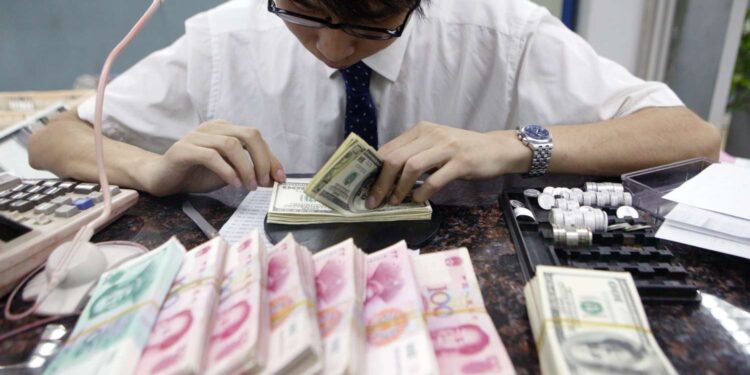In the early hours of Thursday, major state-owned banks in China were observed engaging in dollar selling to purchase yuan in the offshore spot market, according to two sources with direct knowledge of the matter. The move was a strategic measure to curb the pace of yuan declines, as the Chinese currency faced depreciation pressure.
China’s central bank also took action on Thursday by announcing the relaxation of a cross-border financing rule. This new policy aims to facilitate domestic firms in raising funds from overseas markets, effectively easing the depreciation pressure on the yuan.
As a result of these developments, China’s offshore yuan saw a significant strengthening of over 0.7% to reach a high of 7.1812 per dollar. However, it later settled at 7.1890 as of 0249 GMT. In the onshore market, the yuan experienced a similar upward bounce, though it remains down approximately 4% against the dollar year-to-date. Consequently, this performance ranks the yuan among the worst-performing Asian currencies for the year 2023.
The move by China’s major state-owned banks to sell dollars and purchase yuan in the offshore spot market showcases the government’s commitment to stabilize the currency amid ongoing economic challenges. The depreciation of the yuan can lead to several adverse effects, including increased costs of imports and capital flight, which can negatively impact the overall economic stability of the country.
The relaxation of the cross-border financing rule by the central bank is likely to provide a much-needed boost to domestic firms seeking to access funds from global markets. By making it easier for these firms to raise funds overseas, they can secure the necessary resources to expand their businesses and undertake new projects. This move is also expected to improve investor confidence and reduce downward pressure on the yuan.
To gain further insight into the situation, an advanced research search reveals that China has been facing external economic challenges due to trade tensions, which have contributed to the depreciation of the yuan. In response to these pressures, the government has been implementing measures to stabilize the currency and bolster the economy.
Overall, the recent actions taken by China’s state-owned banks and the central bank demonstrate a proactive approach to address currency depreciation concerns. As the global economic landscape continues to evolve, these efforts are crucial to maintain stability and promote growth in the Chinese economy. However, close monitoring and adaptive policies may be necessary to navigate the complexities of the ever-changing financial markets and geopolitical dynamics.











